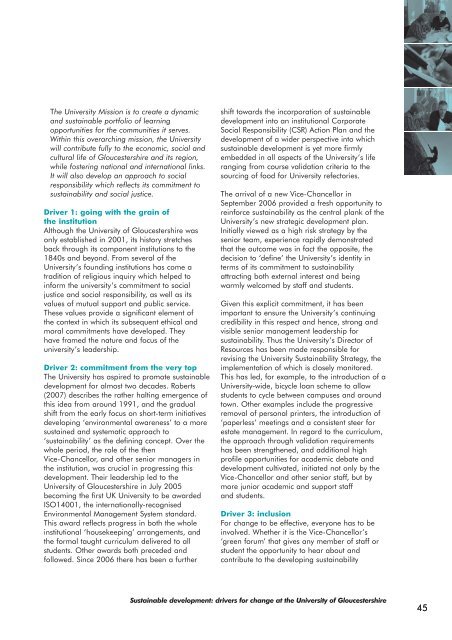HE senior mgrs_Apr18 - Bournemouth University
HE senior mgrs_Apr18 - Bournemouth University
HE senior mgrs_Apr18 - Bournemouth University
You also want an ePaper? Increase the reach of your titles
YUMPU automatically turns print PDFs into web optimized ePapers that Google loves.
The <strong>University</strong> Mission is to create a dynamicand sustainable portfolio of learningopportunities for the communities it serves.Within this overarching mission, the <strong>University</strong>will contribute fully to the economic, social andcultural life of Gloucestershire and its region,while fostering national and international links.It will also develop an approach to socialresponsibility which reflects its commitment tosustainability and social justice.Driver 1: going with the grain ofthe institutionAlthough the <strong>University</strong> of Gloucestershire wasonly established in 2001, its history stretchesback through its component institutions to the1840s and beyond. From several of the<strong>University</strong>’s founding institutions has come atradition of religious inquiry which helped toinform the university’s commitment to socialjustice and social responsibility, as well as itsvalues of mutual support and public service.These values provide a significant element ofthe context in which its subsequent ethical andmoral commitments have developed. Theyhave framed the nature and focus of theuniversity’s leadership.Driver 2: commitment from the very topThe <strong>University</strong> has aspired to promote sustainabledevelopment for almost two decades. Roberts(2007) describes the rather halting emergence ofthis idea from around 1991, and the gradualshift from the early focus on short-term initiativesdeveloping ‘environmental awareness’ to a moresustained and systematic approach to‘sustainability’ as the defining concept. Over thewhole period, the role of the thenVice-Chancellor, and other <strong>senior</strong> managers inthe institution, was crucial in progressing thisdevelopment. Their leadership led to the<strong>University</strong> of Gloucestershire in July 2005becoming the first UK <strong>University</strong> to be awardedISO14001, the internationally-recognisedEnvironmental Management System standard.This award reflects progress in both the wholeinstitutional ‘housekeeping’ arrangements, andthe formal taught curriculum delivered to allstudents. Other awards both preceded andfollowed. Since 2006 there has been a furthershift towards the incorporation of sustainabledevelopment into an institutional CorporateSocial Responsibility (CSR) Action Plan and thedevelopment of a wider perspective into whichsustainable development is yet more firmlyembedded in all aspects of the <strong>University</strong>’s liferanging from course validation criteria to thesourcing of food for <strong>University</strong> refectories.The arrival of a new Vice-Chancellor inSeptember 2006 provided a fresh opportunity toreinforce sustainability as the central plank of the<strong>University</strong>’s new strategic development plan.Initially viewed as a high risk strategy by the<strong>senior</strong> team, experience rapidly demonstratedthat the outcome was in fact the opposite, thedecision to ‘define’ the <strong>University</strong>’s identity interms of its commitment to sustainabilityattracting both external interest and beingwarmly welcomed by staff and students.Given this explicit commitment, it has beenimportant to ensure the <strong>University</strong>’s continuingcredibility in this respect and hence, strong andvisible <strong>senior</strong> management leadership forsustainability. Thus the <strong>University</strong>’s Director ofResources has been made responsible forrevising the <strong>University</strong> Sustainability Strategy, theimplementation of which is closely monitored.This has led, for example, to the introduction of a<strong>University</strong>-wide, bicycle loan scheme to allowstudents to cycle between campuses and aroundtown. Other examples include the progressiveremoval of personal printers, the introduction of‘paperless’ meetings and a consistent steer forestate management. In regard to the curriculum,the approach through validation requirementshas been strengthened, and additional highprofile opportunities for academic debate anddevelopment cultivated, initiated not only by theVice-Chancellor and other <strong>senior</strong> staff, but bymore junior academic and support staffand students.Driver 3: inclusionFor change to be effective, everyone has to beinvolved. Whether it is the Vice-Chancellor’s‘green forum’ that gives any member of staff orstudent the opportunity to hear about andcontribute to the developing sustainabilitySustainable development: drivers for change at the <strong>University</strong> of Gloucestershire45





![[2012] UKUT 399 (TCC)](https://img.yumpu.com/51352289/1/184x260/2012-ukut-399-tcc.jpg?quality=85)




![Neutral Citation Number: [2009] EWHC 3198 (Ch) Case No: CH ...](https://img.yumpu.com/50120201/1/184x260/neutral-citation-number-2009-ewhc-3198-ch-case-no-ch-.jpg?quality=85)





